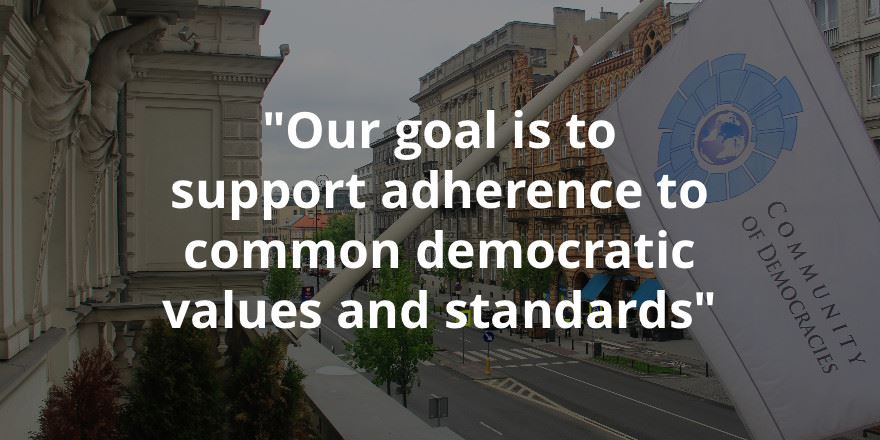Warsaw Declaration


December 3, 2015
As 2016 beckons, it's a good opportunity for those who are concerned about democracy and human rights to review the Warsaw Declaration for a Community of Democracies that 106 countries signed in 2000.
As a Community, countries come together to support the consolidation of democratic values and practices. They are guided by the principles and values of the Warsaw Declaration.
Signed during the opening Ministerial Conference of the Community of Democracies in Warsaw, 2000, it is the founding document of the Community and aptly named “Toward a Community of Democracies.” The Declaration constitutes one of the most complete and coherent outlines of the functions of democracy. It defines the essential practices and norms for the effective establishment and consolidation of democracy.
According to the Declaration, these are the core principles that signing states of the agree to uphold:
- The right of citizens to choose their representatives through regular, free and fair elections, with universal and equal suffrage, open to multiple parties, conducted by secret ballot, monitored by independent electoral authorities, and free of fraud and intimidation.
- The right of every person to equal access to public service and to take part in the conduct of public affairs.
- The right of every person to equal protection of the law, without any discrimination as to race, color, sex, language, religion, political or other opinion, national or social origin, property, birth or other status.
- The right of every person to freedom of opinion and of expression, including to exchange and receive ideas and information through any media.
- The right of every person to freedom of thought, conscience and religion.
- The right of every person to equal access to education.
- The right of the press to collect, report and disseminate information, news and opinions, subject only to restrictions necessary in a democratic society and prescribed by law.
- The right of every person to respect for private family life, home, correspondence, including electronic communications, free of arbitrary or unlawful interference.
- The right of every person to freedom of peaceful assembly and association, including to establish or join their own political parties, civic groups, trade unions or other organizations with the necessary legal guarantees to allow them to operate freely.
- The right of persons belonging to minorities or disadvantaged groups to equal protection of the law, and the freedom to enjoy their own culture, to profess and practice their own religion, and use their own language.
- The right of every person to be free from arbitrary arrest or detention, to be free from torture and other cruel, inhumane or degrading treatment or punishment; and to receive due process of law, including to be presumed innocent until proven guilty in a court of law.
- The right of those elected to form a government, assume office and fulfill the term of office.
- The obligation of an elected government to refrain from extra-constitutional actions, to allow the holding of periodic elections and to respect their results, and to relinquish power when its legal mandate ends.
- That the aforementioned rights will be enforced by a competent, independent and impartial judiciary open to the public.
- That elected leaders uphold the law and function strictly in accordance with the constitution and procedures established by law.
- That government institutions be transparent, participatory and fully accountable, and take steps to combat corruption.
- That the legislature be elected, transparent and accountable to the people.
- That civilian, democratic control over the military be established and preserved.
- That all human rights be promoted and protected.
The Warsaw Declaration acknowledges that democratic development is a process, in which each country is at a different stage. No country has reached perfection and all should work together to meet these objectives, supporting each other while respecting each state’s sovereignty. The best way to strengthen democratic institutions and principles is by promoting discussion, exchanging experiences and identifying best practices. This collaboration makes us a community; we cooperate, learn together, share common values, and encourage each other to uphold these principles.
On a practical note, the Warsaw Declaration suggests the ways to achieve these goals:
- to promote civic education, including education for democracy,
- to support civil society and independent media,
- to work with relevant institutions and international organizations,
- to assist each other in economic and social development, including eradication of poverty,
- to collaborate in existing international and regional institutions aimed at promoting democratic governance.
According to the Warsaw Declaration, these methods will help create an environment conducive to democratic development.
Photo: The Ministerial Conference in Warsaw, 2000.
Photo accreditation: Ministry of Foreign Affairs of Poland



